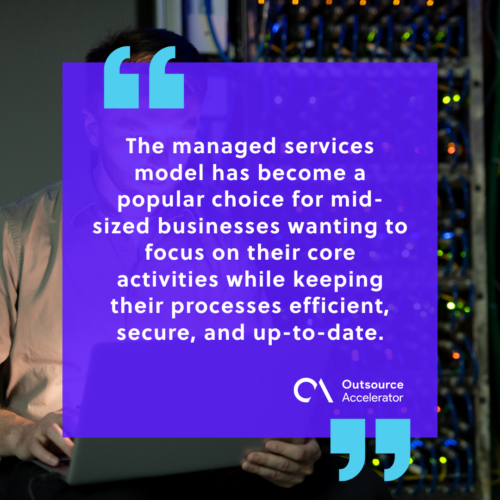Adopting a managed services model to maximize business operations

Businesses’ fast-paced environment requires effectively managed processes, IT infrastructure, and systems. These are crucial in maintaining operational efficiency and staying competitive.
However, as technology evolves, this task becomes increasingly complex and resource-intensive. This is where a managed services model can provide significant advantages.
In the 490th episode of the Outsource Accelerator Podcast, Yassin Shaar, CEO of Origo BPO, explains how leveraging the managed services model can help strengthen businesses’ agility and boost day-to-day processes.
Defining the managed services model
The managed services model is a strategic approach to outsourcing certain business functions, primarily related to IT and technology, to an external provider known as a managed services provider (MSP).
This model allows organizations to offload the management, operation, and upkeep of specific services, enabling them to focus on their core business activities.
Other MSPs focus their solutions on specific industries as they are able to effectively deliver in terms of the following:
- Value through their specialized knowledge
- Customized solutions
- Regulatory expertise
- Understanding of industry-specific challenges
Premier third-party service providers like Origo BPO specialize in managed services aimed at mid-market field services companies.
According to Yassin, a lot of these field services businesses “don’t have documented processes and they’re trying to just bring them all together under one brand or one umbrella or one process or one system. And it’s a lot of hard work….
So, that’s why we provide shared services as a service or managed shared services…We hire, train, manage, and continuously improve your process,” he adds.
Benefits of using a managed services model
The managed services model has become a popular choice for mid-sized businesses wanting to focus on their core activities while keeping their processes efficient, secure, and up-to-date.
Here are five key advantages of using this model:
1. Cost efficiency
Managed services transform operational costs from variable expenses into predictable, fixed monthly fees.
This model eliminates the need for large capital expenditures on things like hardware, software, and personnel, reducing overall spending.
The CEO explains, “A lot of these enterprises and mid-market companies come with big problems. We’re talking about tens of millions of dollars in collections, thousands of invoices piling up in the backlog, double-digit abandonment trade…
That’s costing them more than a dollar or two, that they would pay extra for that managed service provider that would deliver value, and that managed service provider is bringing that innovation, that capability, that specialization…
And as you know, in the mid-market and enterprise, it’s all about buying time, money is time.”

2. Access to expertise and advanced technology
MSPs provide access to a team of professionals with specialized skills and knowledge.
These experts stay current with the latest technological advancements and industry best practices. They ensure that businesses benefit from cutting-edge solutions and innovations.
As for MSPs, Yassin says, “You got to make sure that you set your foundation right. You have a core market where you’re defensible, and try to find a market where there’s not a lot of outsourcing activity happening.”
Top-level expertise is often difficult and expensive to maintain in-house, especially for small to medium-sized companies.
3. Enhanced security and compliance
Cybersecurity is a critical concern for businesses of all sizes. MSPs offer comprehensive security services, including:
- Threat monitoring
- Risk assessment
- Vulnerability management
- Incident response
They make sure that systems are protected against evolving cyber threats and help businesses comply with relevant regulations and standards, such as GDPR, HIPAA, and PCI-DSS.
Leveraging a managed services model can help reduce the risk of data breaches and legal penalties.
4. Improved reliability and performance
MSPs utilize advanced monitoring tools and techniques to oversee the performance of personnel and systems continuously.
They identify and resolve potential issues before they cause significant disruptions, ensuring high levels of system reliability and uptime.
Origo BPO puts great emphasis on each of their client’s needs before anything else. Per Yassin, one of their core principles is Lean Six Sigma. He recommends that companies make it part of its business DNA.
“How does my customer define value and how can I deliver more of it faster, better, cheaper? Once you’re aligned to that, then making money and getting the profits that you want and getting growth becomes a lot easier.”
Proactive management minimizes downtime, enhances productivity, and allows businesses to operate smoothly without unexpected interruptions.
5. Scalability and flexibility
The managed services model offers scalability, allowing businesses to adjust their resources and services based on their evolving needs.
Whether expanding operations, launching new projects, or handling seasonal fluctuations, MSPs can quickly adapt to changes, providing the necessary support and resources.
This flexibility ensures that businesses can grow and adapt without facing constraints.
Embracing managed services model to amplify growth
In 2022, the worldwide market for managed services reached a value of $262.08 billion.
It is expected to surge to around $446.27 billion by 2029, with a projected compound annual growth rate (CAGR) of 7.9% from 2023 to 2029.
These numbers only prove that more and more global businesses are turning to managed services providers to boost their development and expansion.
This also means that the future for Origo BPO looks promising. Yassin shares what’s to look forward for the company: “We’re setting ourselves up to expand into a lot more verticals as we dial in.”
Aside from field services, the CEO, together with his team, plans to extend their services into route-based businesses, logistics and delivery, OEMs, and manufacturing.
Adopting the managed services model presents a strategic opportunity for businesses to unlock new levels of innovation and scalability – positioning themselves for long-term success.







 Independent
Independent




